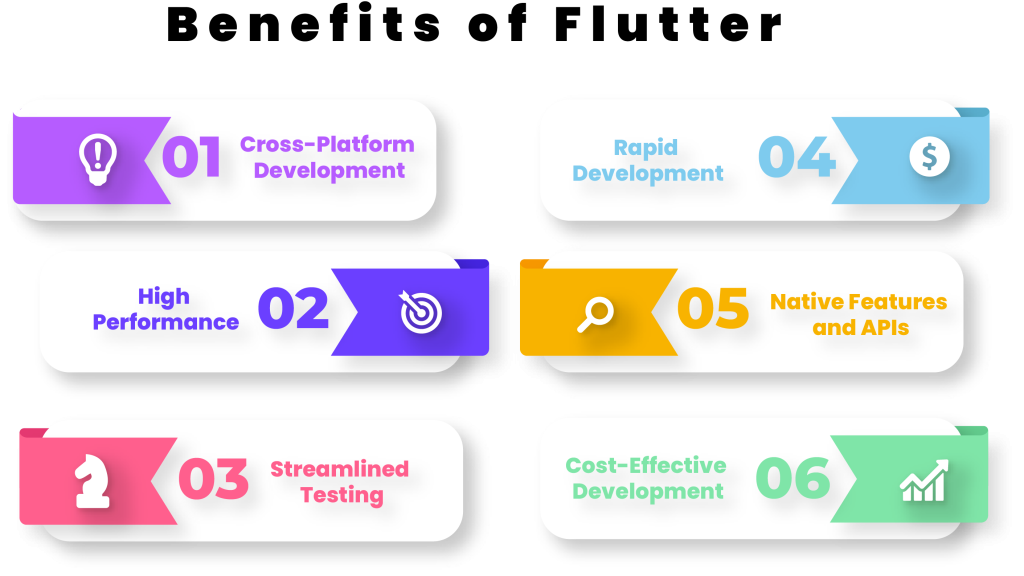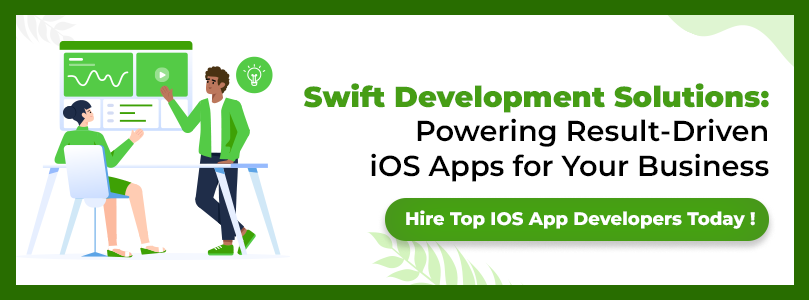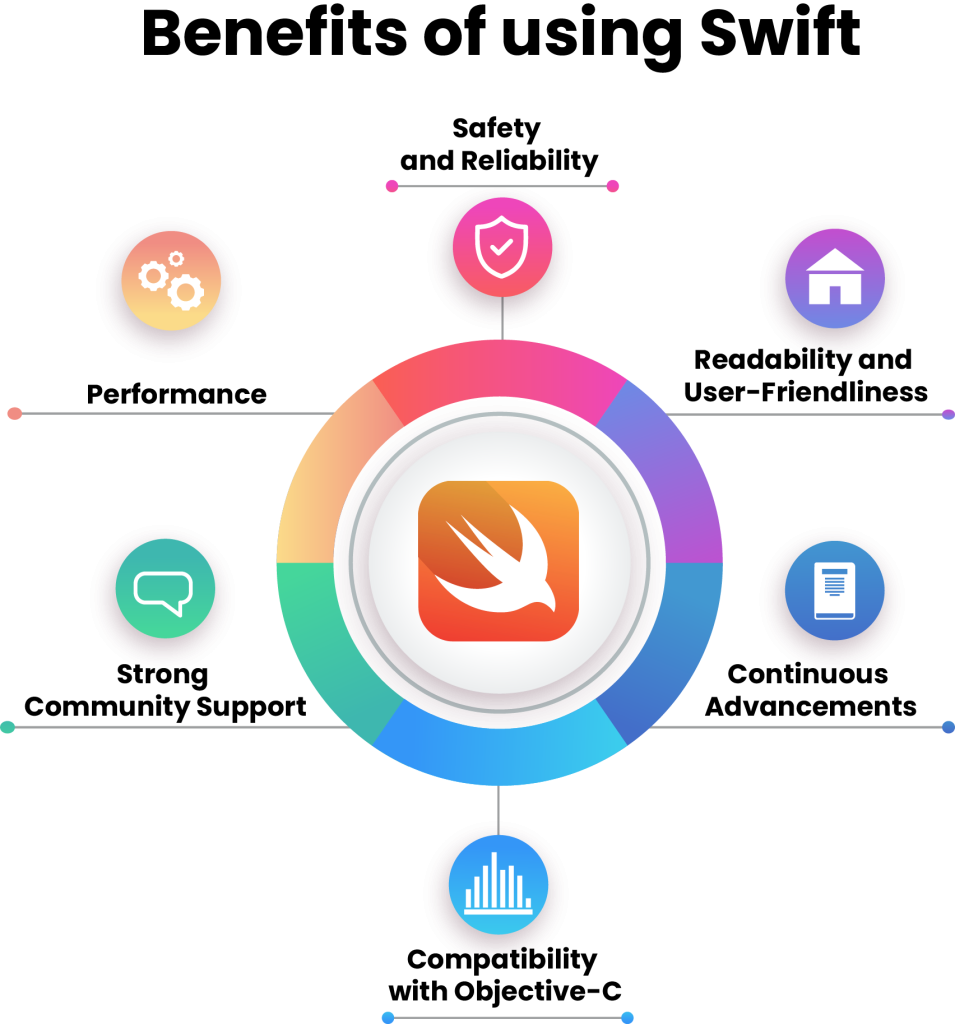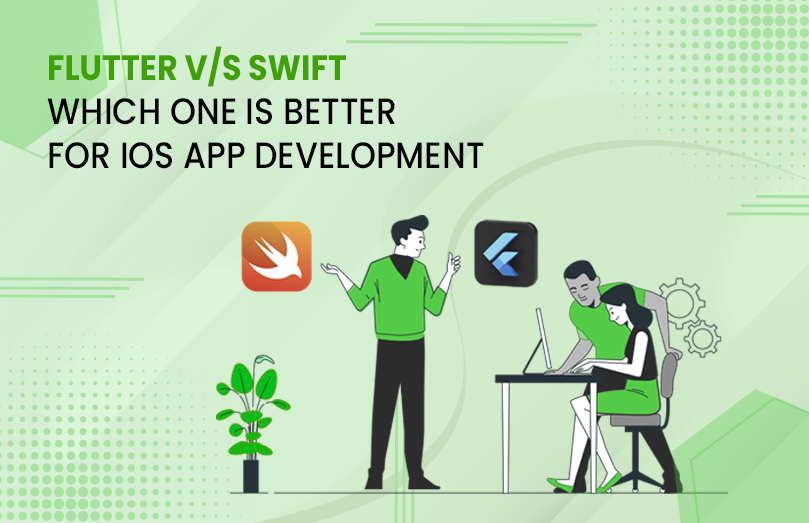The field of iOS app development services has witnessed the rise of two prominent technologies: Flutter and Swift. Developed by Google, Flutter is an open-source UI software development kit (SDK) enabling cross-platform mobile app creation. On the other hand, Apple’s swift is a programming language tailored for iOS, macOS, watchOS, and tvOS app development. Each technology possesses distinct features and benefits, underscoring the need for developers to comprehend their respective strengths and limitations when selecting the ideal platform. This blog aims to examine Flutter vs Swift’s difference, critical factors, compare Flutter and Swift, and ascertain which platform better aligns with iOS app development requirements.
What is Flutter?
Flutter is an open-source software development kit (SDK) introduced by Google, specifically designed for building applications with dynamic user interfaces (UIs). It allows developers to create natively compiled apps for mobile, web, and desktop platforms, utilising a single codebase. This approach streamlines and optimises cross-platform app development, providing numerous benefits for mobile app development.
Benefits of Flutter

- Cross-Platform Development: Flutter empowers developers to construct applications for both Android and iOS platforms using a unified codebase. This eliminates the need to write separate code for each platform, saving significant development time and effort.
- Rapid Development: Its hot reload feature enables real-time visualisation of code changes as developers work, expediting the development process. It facilitates quick experimentation, iterative improvements, and efficient debugging.
- Customizable and Aesthetic UI: It boasts an extensive collection of customizable UI widgets that empower developers to craft visually captivating and native-like user interfaces. The developers can effortlessly create beautiful UI elements, animations, and transitions, leading to a polished and engaging user experience.
- High Performance: Flutter apps are compiled directly into native code, resulting in exceptional performance and swift execution. Unlike frameworks that rely on JavaScript bridges, Flutter’s mobile app design and development services ensure seamless and responsive app performance.
- Native Features and APIs: Flutter seamlessly integrates with native features and APIs, enabling developers to harness device-specific functionalities such as the camera, GPS, sensors, and more. This grants Flutter apps native-like capabilities and maximises the utilisation of the underlying platform’s potential.
- Streamlined Testing: Since Flutter apps operate on a single codebase, testing efforts become more efficient and streamlined. Developers can conduct comprehensive testing for both Android and iOS platforms simultaneously, saving valuable time and effort.
- Robust Developer Community and Resources: Flutter benefits from an active and supportive developer community, offering a wealth of documentation, tutorials, and resources. Developers can easily access valuable information, seek assistance, and remain updated with the latest trends and best practices.
- Cost-Effective Development: Flutter’s cross-platform nature significantly reduces development and maintenance costs. Businesses and startups can allocate resources efficiently without the need for separate development teams or resources for different platforms, resulting in cost-effective app development.
What is Swift?
Swift is a robust and user-friendly programming language conceived by Apple to facilitate the development of applications within their ecosystem, encompassing iOS, macOS, watchOS, and tvOS. Swift’s core objective is to provide a secure, efficient, and expressive coding environment, equipped with contemporary features that streamline and enhance the process of mobile app development, making it both efficient and enjoyable for developers.

Benefits of Using Swift
- Readability and User-Friendliness: It was specifically designed to promote code readability, making it easier for developers to comprehend and write clean, expressive code. Its syntax is concise and expressive.
- Safety and Reliability: Swift incorporates modern programming concepts that enhance the security and reliability of applications. It includes features such as optionals, type safety, and automatic memory management, which effectively prevent common programming errors and improve the overall stability of apps.
- Performance: As a compiled language, Swift fully utilises the capabilities of the underlying hardware, resulting in faster execution times and seamless app performance. Advanced compiler technologies, such as automatic memory management and efficient memory access, contribute to the speed and responsiveness of Swift-based applications.

- Compatibility with Objective-C: Swift seamlessly integrates with Objective-C, enabling developers to effortlessly combine Swift and Objective-C code within the same projects. This compatibility allows for the utilisation of existing libraries, frameworks, and codebases, facilitating a smooth transition to Swift.
- Interactive Development with Playgrounds: Swift playgrounds provide developers with a powerful tool for interactive experimentation and prototyping. It allows quick testing of ideas, visualising results, and refining code, thereby enhancing the iterative and efficient nature of the development process.
- Strong Community Support: Swift has gained significant popularity, boasting an active community of developers who actively contribute to its growth. This vibrant community offers an abundance of resources, tutorials, and open-source libraries, providing developers with ample opportunities to find solutions, learn, and collaborate.
- Continuous Advancements: Swift is a language that continually evolves through regular updates and enhancements from Apple and the open-source community. This ensures that Swift remains up-to-date with the latest industry advancements and best practices, enabling developers to leverage new features and capabilities for their app development needs.
A Comparison: Flutter vs Swift
When considering mobile app development, it is important to make a comparison between Swift and Flutter in order to determine the most suitable technology for your specific requirements:
- Programming Language: Swift is a programming language developed by Apple specifically for building applications on their platforms such as iOS, macOS, watchOS, and tvOS. In contrast, Flutter is an open-source UI software development kit (SDK) created by Google, enabling app development across multiple platforms including iOS, Android, web, and desktop.
- User Interface: Swift relies on native UI components, providing a familiar and consistent user experience on Apple platforms. On the other hand, Flutter offers its own customizable UI widgets, allowing developers to create visually appealing and consistent user interfaces across various platforms. While Flutter’s UI is not native, it can achieve a similar look and feel.
- Development Efficiency: Flutter offers the advantage of writing code once and deploying it across multiple platforms, following the “write once, run anywhere” principle. This reduces development time and effort by eliminating the need for separate codebases for different platforms. In contrast, Swift requires distinct codebases for iOS, macOS, watchOS, and tvOS, which can necessitate more development resources.

- Performance: Swift is compiled into native code, resulting in optimized performance and faster execution times. While Flutter employs a layered architecture and renders UI components, which may introduce a slight performance overhead compared to fully native apps, its performance is generally considered to be highly efficient and smooth.
- Community and Resources: Swift benefits from a large and active developer community, offering an extensive range of resources, libraries, and frameworks. Flutter also boasts a growing community and provides a variety of resources, including UI widgets, packages, and documentation. However, Swift’s community is more established due to its longer history.
- Platform Integration: Swift seamlessly integrates with Apple’s frameworks, enabling access to native features and APIs, including device-specific functionalities. Flutter, on the other hand, offers its own set of plugins to access native features, although achieving the same level of integration as Swift may require additional effort.
Wrapping up!
Swift is well-suited for native app development on Apple platforms, providing excellent performance and seamless integration with Apple’s frameworks. Flutter, on the other hand, offers cross-platform development capabilities, allowing developers to write code once and deploy it across multiple platforms. It excels in delivering visually appealing user interfaces and offers development efficiency, although potentially requiring more effort for platform-specific integrations.
Ultimately, the choice between Flutter and Swift depends on the specific mobile app design and development services needs and priorities of your iOS app development project. Evaluating the pros and cons, understanding the project requirements, and considering the expertise of your development team will help you make an informed decision.
Whichever technology you choose, both Flutter and Swift provide powerful tools and frameworks to create compelling iOS applications that meet the demands of today’s mobile users.
Experience the epitome of mobile app development with MMF Infotech! As a leading mobile app development company, MMF Infotech is dedicated to transforming your ideas into innovative and engaging mobile applications. Our team of highly skilled developers and designers utilise the latest technologies and industry best practices to create tailor-made apps that cater to your specific business requirements. Whether you desire a captivating iOs app developed with Swift or a feature-rich Android application using Flutter, our expertise extends across both platforms. With a strong emphasis on user experience and advanced functionality. Unlock the limitless potential of mobile app technology with MMF Infotech. Contact us today to embark on an extraordinary app development journey.


